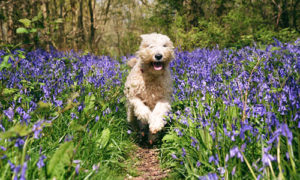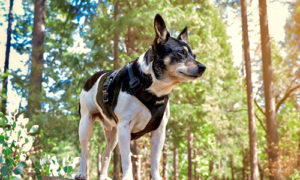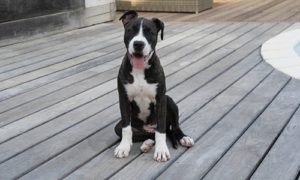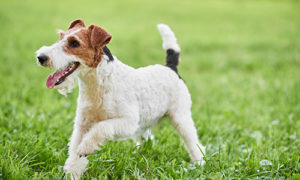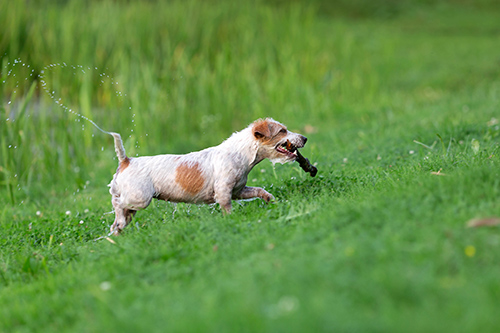
The Parson Russell Terrier can trace its beginnings to a dog named Trump, purchased by the Parson John Russell of Devonshire, England, during the mid-1800s. A fox-hunting enthusiast, John Russell sought to develop terriers that could bolt and dispatch fox and keep up with the horses. The strain he created was highly successful and eventually carried his name.
John Russell was highly active in the English Kennel Club; however, for some reason, he declined to show his dogs in conformation shows. Other Parson Russell Terrier owners followed John Russell’s example and proved their dog’s courage in the field rather than in the show ring. And this tradition still holds today.
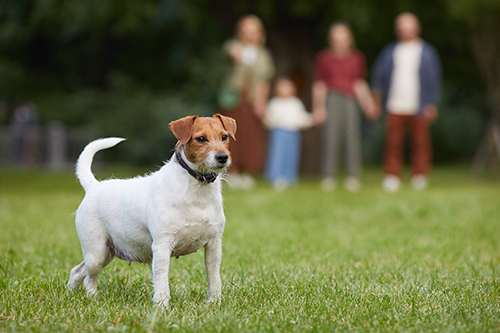
The Dogs Love Horses
After heated debates in which most enthusiasts did not agree with the AKC recognition, the breed was entered into the Terrier Group in 1998. In 1991, it was entered into conformation classes as the Parson Jack Russell Terrier in England.
Jack Russells have been popular with horse owners for some time and are frequently seen around stables; however, the terriers on those stables have long bodies and short legs. Parson was the term given to distinguish the traditional long-legged terrier. Although already recognized, the dog’s name was changed from Jack Russell Terrier to Parson Russell Terrier in 2003.
The Parson Russell Terrier has become a famous dog in media, and its exposure caused great interest in the breed from potential owners. Because of this exposure, the breed’s popularity is growing in alarming numbers. As irresistibly adorable this breed may be, it is not a dog for everyone.
Breed Standard
The dog is sturdy, compact, rugged, and designed to hunt fox above and below. It is squarely proportioned and well-balanced, with moderate bone and a slight arch over the loin. The protective coat can be rough or smooth. The tail is docked, and the feet are round. The Parson’s skull is flat, and it has a solid rectangular muzzle, small v-shaped ears held close to the head, and almond-shaped eyes.
Breed Facts
| Energy level | Watchdog ability | ||
| Exercise requirements | Protection ability | ||
| Playfulness | Grooming requirements | ||
| Affection level | Cold tolerance | ||
| Friendliness toward dogs | Heat tolerance | ||
| Friendliness toward other pets | Friendliness toward strangers | ||
| Ease of training |
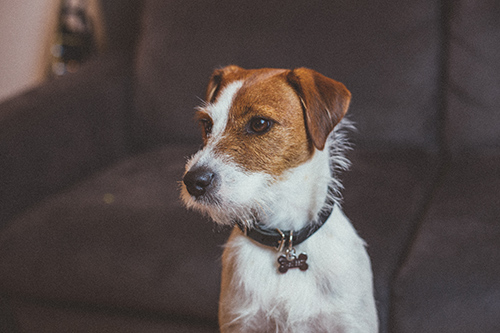
Activity Level: High. This dog has exceptional endurance, strength, and a strong hunting drive. A fenced yard is recommended. Parson Russell Terriers excel in earth dog events, agility, flyball, and lure coursing. They need plenty of physical and mental stimuli daily. This dog does not do well if cooped up in the house all day. It requires strenuous games, a long walk, or a short training session. The dogs love to explore independently if given a chance, but it must be within a safe area because they tend to attract trouble. Some Parson Russell Terriers are notorious for going down holes and must be rescued.
Group: Terrier
AKC Recognition: 1997
- Popularity: Uncommon
- Family Group: Terrier
- Country of Origin: England
- Date Developed: 1800s
- Original Purpose: Fox baiting
- Current Function: Earthdog trials
- Other Names: Jack Russell Terrier, Parson Jack Russell Terrier
Grooming
The smooth-type coats need to be brushed weekly. The broken coat types should be hand stripped, which may take two to three hours weekly.
Coat: The breed’s harsh weatherproof double coat can be broken or smooth; both coat types are dense, straight, and protective. The broken coat is crisp and wiry.
Color: White with black or tan markings, tricolor
Parson Russell Terrier Temperament
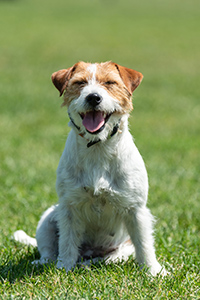
Parson Russell Terriers are working fox hunters that are bold, confident, fearless, tenacious, and alert. The Parson is intelligent, quick to learn, and has excellent problem-solving skills along with single-minded determination. Without an outlet for their energy or supervision, they will get into trouble. The dogs are highly loyal and affectionate companions but do not always get along with other dogs. Because of their intense hunting instincts, they’re not recommended for homes with small pets.
The Parson Russell Terrier thrives on action and adventure. In the process, it repeatedly finds itself in the center of trouble. It is a true hunter and will wander, explore, dig, and chase when the opportunity presents itself. The dogs get along well with children and strangers. However, they can be contentious with strange dogs, but it is better than other terriers. The breed is highly tolerable of horses but will chase cats and rodents.
The dogs make for ideal companions, but they dig and bark a lot. Owners with a good sense of humor and willing to tolerate a lot of mischief and entertainment in one dog will love the Parson Russell Terrier.
Health
- Major Health Concerns: none
- Minor Health Issues: lens luxation, patellar luxation
- Rarely Seen: glaucoma, ataxia, compulsive behavior, Legg-Perthes, deafness
- Recommended Tests: eye, knee, hearing
- Life Span: 13 to 15 years
- Weight: 13 to 17 pounds
- Height: 12 to 14 inches
Breeder and Buyer’s Advice
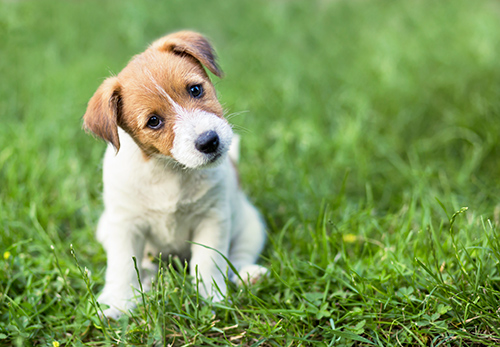
Potential owners need to be prepared for a high-energy and intelligent hunting dog. They require constant and consistent leadership, a structured routine, and an outlet for their immense energy. You can find a puppy buyer’s guide on the parent club’s website. There you will find Information pertaining to Parson Russell Terrier puppies for sale and reputable breeders.
Parent Club: Parson Russell Terrier Association of America; founded in 1985. In 2003, the Club switched its name from “Jack” to “Parson.”
Rescue: The Parson Russell Terrier Rescue Network can be accessed by visiting the parent club’s website.
Frequently Asked Questions
- Is a Parson Russell Terrier a good pet? Absolutely. Absolutely. However, because of the dog’s strong hunting instincts, they are not recommended for people unable to give them proper mental and physical exercises.
- Are Parson Russell terriers cuddly? Yes they are.
- Is a Parson Terrier the same as a Jack Russell? Yes. The Parson Russell Terrier’s other name is the Jack Russell Terrier.
- Are Parson Russell terriers rare? Yes, the dogs are uncommon.

